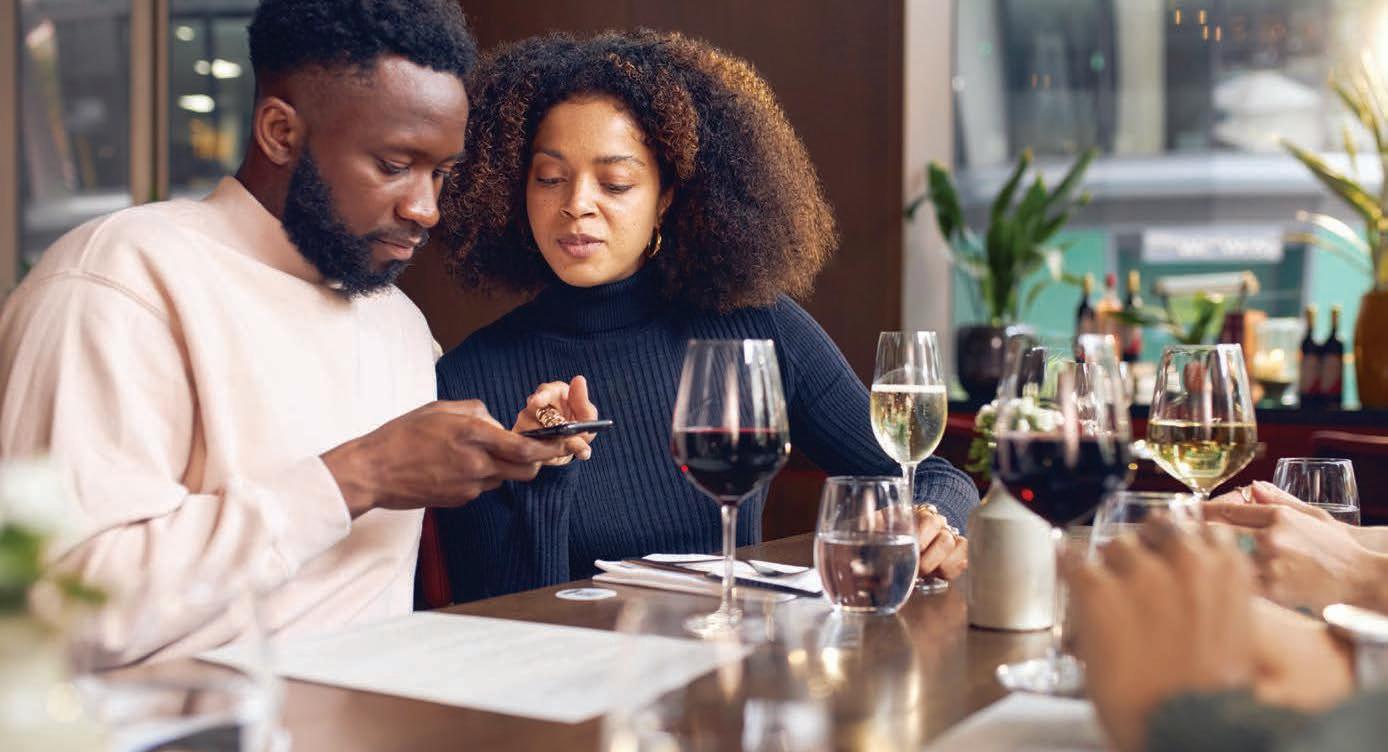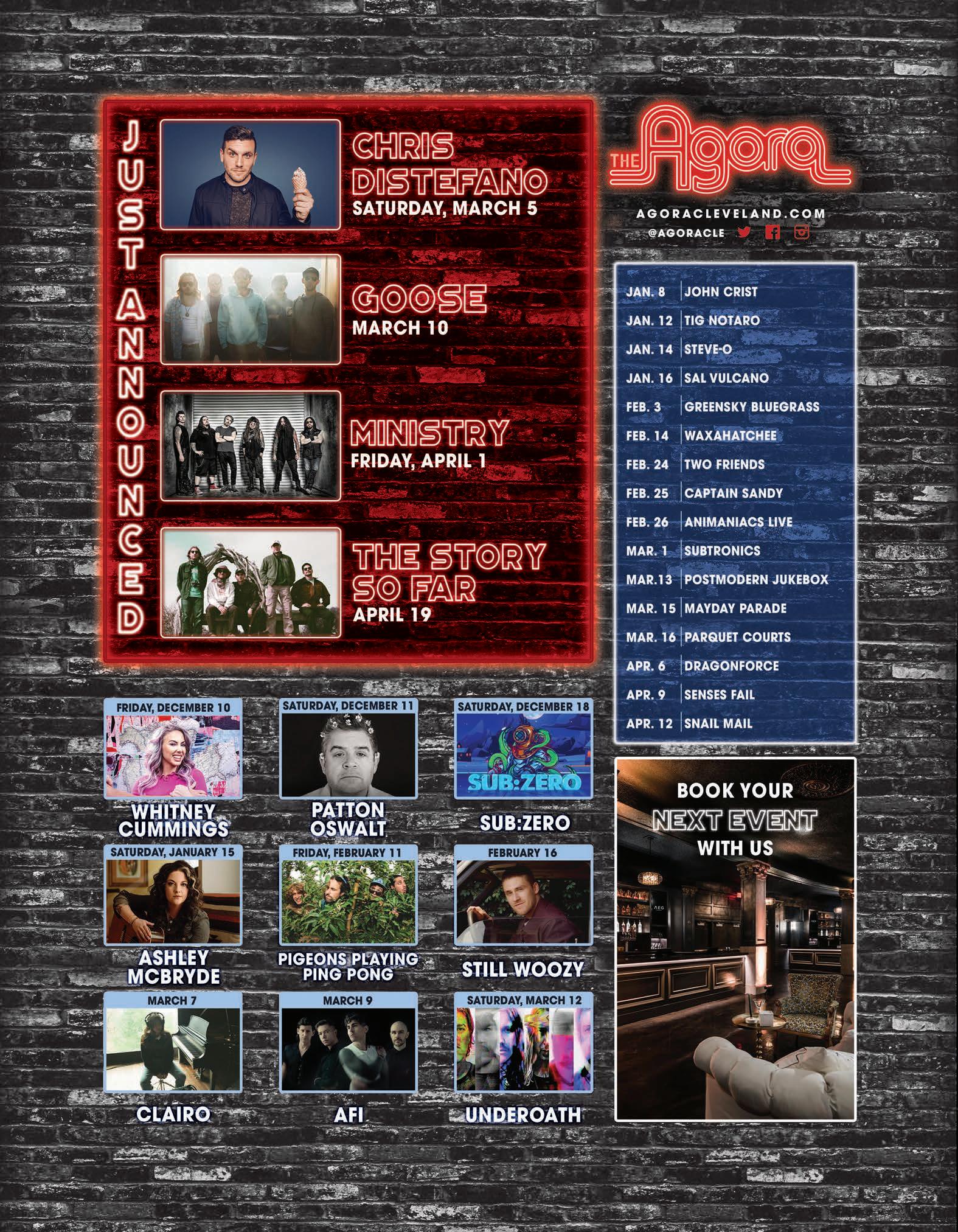
18 minute read
Feature


Advertisement

ON THE FLY Tech solutions that helped Cleveland restaurants survive the pandemic are also driving long-term benefits for both owners and diners

By Douglas Trattner
RESTAURANT OWNERS HAVE
been notoriously slow to adopt new technologies, preferring instead to cling to time-tested practices like hand-written guest checks, mechanical cash registers and analog reservation books long after better options were available. But that all changed on March 15, 2020, the day that Ohio bars and restaurants were ordered by the Department of Health to shut down their dining rooms. To cling to any hopes of survival, restaurant operators were compelled to put all their eggs into the take-out and delivery basket. While many continued to man the old landlines, others scrambled to establish online ordering, digital payment processes and expanded delivery. Before long, Cleveland diners were experiencing their first ghost kitchens, attending pop-ups they learned about from Instagram and pre-paying for meals using Venmo.
If there is a silver lining to the pandemic, it is this burst of technological advancements that diners have been demanding and desiring for years. According to the National Restaurant Association, a full one out of two diners want restaurants to adopt more, not less, technology, mainly in the order and payment process.
“I will emphatically say that this is here to stay,” says Drew Winick, senior district sales manager with digital point-of-sale (POS) system provider Toast. “As bad as things have been, it’s moved the restaurant industry at least five years forward for something that was coming. A lot of this technology is only going to improve and advance, but it is certainly not going anywhere.”
Online Ordering for Pick-Up and Delivery
It’s difficult even to recall a time when everything wasn’t a few taps of a smartphone away, but pre2020, online ordering, payment and delivery still was extremely rare in the independent restaurant space. UberEats had an inauspicious local launch in 2016, DoorDash didn’t land here until 2018, and GrubHub routinely earned censure for adding non-partner restaurants to its roster.
In July of 2020, just months after the Governor shut down indoor dining, Doug Katz launched Chimi in Cleveland Heights, one of the first ghost kitchens in the area. The thenforeign concept relied exclusively on online ordering, curbside pick-up and delivery. The novel, seamless and satisfying technology allowed diners to view the current menu, order a complete meal, pay for it via the web and pick it up at a designated time with almost zero face-to-face interaction. The format proved so successful that Katz introduced a second ghost kitchen concept, Amba, just four months later.
Ben Bebenroth took the ghost kitchen concept even further when he launched Keep the Change, a “virtual food hall” with multiple concepts under one roof. The robust technology behind the curtain makes it possible for customers to choose from four different “restaurants” when placing an order for pick-up or delivery. Because no money was invested in brandspecific menus, furniture, interior design or tableware, Bebenroth could easily mothball an underperforming concept and replace it with something else. The real-time tech also makes it possible to test out new concepts – like Boom’s Pizza – on a trial-run basis.
For restaurant operators who want to leave all those complex technological details (and startup expenses) to someone else, there are options like CloudKitchens. When the Cleveland facility opens soon in MidTown, it will have 29 rentable kitchens available to local, regional and national food brands. Leases come not just with gas hook-ups, sinks and a hood, but also proprietary restaurant management technology that streamlines everything from order taking and kitchen fulfillment to partnering with third-party delivery services like Uber Eats, Grubhub and DoorDash.
“It’s a much smaller investment and that’s what’s attractive about the whole thing,” explains Bac Nguyen, who dropped a mini–Ninja City into the Columbus CloudKitchens. “You can get up and running in a matter of months with far less money than you would if you were trying to open your own ghost kitchen.”
Without apps like Instagram and Venmo, Jordan Lakin would still be saving his pennies in hopes of launching a Detroit-style pizza shop. But when the whole world decided to stay home, Lakin saw a window of opportunity open as wide as the Montana sky. Without so much as a storefront, website or marketing budget, he launched Corner Spot, a pick-up-only pizza concept that went viral.
“There’s no doubt that the ability to generate the interest and the energy – and also to let people see your product – has been helped greatly by social media,” he explains. “Up until now, I haven’t even had to pay for a website. Being able to operate in such a lean way has been helpful.”
Lakin quietly launched Corner Spot in the summer of 2020, when he sent an email to a small group of friends advertising his pizza. As his social media following grew, so too did the orders, which were prepaid through Venmo and picked up within a short two-hour window on weekends.
“The best part of that is it’s a prepayment system, which allows me to run the business in a way that’s unique because people pay for their pizzas before they get them,” Lakin says. “That’s super helpful for cashflow.”
More importantly – at least back in the summer of 2020 – was the speed and efficiency of the pick-up process. Because the pies are all prepaid, there is no person-to-person interaction save for the church parking lot handoff.
Other pop-ups fueled by social media, online ordering and prepayment systems include Martha on the Fly, a quick-serve breakfast concept that takes over Good Company on weekends, MarMar’s Pizza, which utilized a sidelined restaurant kitchen in Beachwood, and Roaming Biscuit, the peripatetic breakfast biscuit outfit.
Bouncing Back While Scaling Back
For more than half a century, Bialy’s has been the place to go on the East Side of town for hot, fresh and steamy bagels. And while the price of a baker’s dozen of fragrant mish-mosh might have climbed from $1.50 to $16 over the years, the accepted method of payment had never wavered: cold hard cash or bust. Bialy lovers have relatively new owners Rachel and Sarah Gross to thank for moving the shop into the modern era when they replaced the mechanical cash register with a newfangled POS system that accepts alternate forms of payment.
But we have Covid to thank for ushering in the next big advancement. After shutting down production in March of 2020, the sisters elected to fire up the ovens one month later. But the kitchen is small and the retail storefront even smaller, so in an effort to minimize the risk of transmission, the business launched an online pre-order and payment system. Knowing what and how much to bake days in advance allowed the shop to scale back staff. Customers were not permitted inside the store, instead retrieving their orders out front at a designated time.
“It sounds really simple, but it was a lot more timeconsuming,” Rachel Gross says of the progression. “When we first implemented Toast, we were just ringing out the total number of bagels that people bought, we weren’t ringing out that it was three mish-mosh or four plain or whatever. When we wanted the online ordering to be a thing, we couldn’t just have people order 12 bagels, we needed to know what 12 bagels they we’re ordering.”
Even a company as contemporary and forward-thinking as Choolaah was caught ill-prepared for the Covid-inspired digital revolution. The fast-casual Indian BBQ concept launched in Orange Village six years ago but had been so obsessively focused on food quality and restaurant expansion that they failed to develop the sort of robust tech that customers would begin demanding in 2020.
“We did not have an app, we did not have delivery, and our online ordering was weak,” says CEO Randhir Sethi. “We fixed all of that in the first week because it was already in the works. Without that we wouldn’t have made it.”

Corner Spot pizza, which launched using Instagram and Venmo. DOUG TRATTNER
The Return to Dining Rooms
As diners began returning to restaurant dining rooms, the focus shifted to cutting-edge health and safety protocols like surface sanitation, air filtration and germicidal UV lights. At the same time, printed menus were jettisoned in favor of QR codes that conjured digital versions on diners’ smartphones. These “touchless” menus provide benefits beyond just peace of mind for guests; they allow the restaurant owner to be more responsive to mounting problems like supply chain issues. Instead of having to print up new menus – or have servers apologize to diners – when a vendor runs out of chicken wings, a manager simply can remove them from the digital menu.
Andy Himmel cut his teeth in fine dining, so he’d be the first to admit to being slow to adopt new technology at his restaurants, especially if it hinders the guest experience. But the pandemic did accelerate the transition to a handheld POS system at his company’s three Paladar locations and four Bomba Taco shops. The devices carried by servers reduce the number of trips staffers need to make to service stations, bars and kitchens, thus making the whole process more efficient. A positive side effect, notes Himmel, is better paid servers.
“I do see real value in the handhelds,” he reports. “At the end of the day, it comes down to reducing steps, and there’s no question that when someone has a handheld, there is the ability to reduce steps that the person has to take. As we’re looking to find a model where we could have a few less servers that make more money, I think that’s better for retention long term.”
Himmel adds that while there is a minor learning curve for employees at the outset, the system cuts down on mistakes, mix-ups and omissions between servers and the bar and kitchen. What’s more, the ability of the servers to accept payment anywhere in the restaurant means never having to hand over your credit card.
“Like everything with Covid, the idea of taking and keeping a credit card and then bringing it back, with the guest not knowing where it’s been and who touched it, it almost seems old-fashioned overnight,” adds Himmel.
When diners walk into ETalian in Chagrin Falls, they can elect to stand in line at the register or head over to the self-ordering kiosk. The iPad-like device allows customers to view the menu, place orders, make modifications and pay with the tap of a credit card. That order gets immediately transmitted to the kitchen, ahead of customers still standing in line. When the order is ready, you’ll receive a text.
“It’s crazy how fast things have changed, but the client dictates what we do as restaurateurs,” says owner Eddie Tancredi. “Ten, 15 years ago, everybody wanted that sit-down, white-tablecloth experience. Now, people want something that’s still really good, but they want it quick and to not take up their whole night.”
The Future of Dining In
Walk into Butcher and the Brewer downtown on a game day and you might encounter a bar three-deep with thirsty guests. But thanks to GoTab, a mobile point-of-sale system, a customer can order a beer from anywhere in the building and receive a notification when it’s ready and waiting at the bar. For those seated


Amba, one of Doug Katz’s pandemic ghost kitchens.
DOUG TRATTNER
at a table for a meal, the QR codebased system lets food runners know precisely where to bring the grub when it’s ready.
“This has vastly improved our ability to get food and drink to you in a quicker time so you can get out the door and head to your event in a timely manner, even when we are short staffed,” says partner Jason Workman.
Butcher and the Brewer is the first full-service restaurant in the region to employ the technology, which means there’s a slight learning curve for guests initially to summit. After starting a tab, customers must input their personal and payment information. The process is not unlike opening an account with a scooter-sharing service like Lime: after setting everything up the first time, subsequent uses are quick and painless.
“The biggest hurdles we are facing is changing behavior,” adds Workman. “This flips the service model upside-down; usually you deal with credit cards at the end of the meal. We’re asking you to do this stuff up front. But then you’re done, and the next time you come in, you don’t have to do any of that.”
Benefits for the diner include the ability to order what you want when you want it, splitting tabs with tablemates and walking out the front door without ever having to flag down a server. If you forget to close out your tab, it will happen automatically at closing time. Benefits for the restaurant include the ability to serve more people with fewer staff, increase pay (and thus retain employees) and operate a cashless business, which is more sanitary, eliminates end-of-shift drawer counts, and kills dodgy latenight bank deposits.
Old-Fashioned and Proud of It
Of course, restaurants are as individual as the people who operate them and when it comes to technology, not everybody is on the same page. Chef Jeremy Umansky says there are practical reasons why diners will not find Larder, his Ohio City deli, on third-party delivery apps like Uber Eats, DoorDash and Grubhub.
“None of the technology companies have a solution for a business like ours that changes in real time,” he explains. “They’re designed for restaurants that maybe change their menu twice a year or not at all. The amount of work I would have to do on my end to change the menus and update the counts, it’s not worth it for us.”
Umansky says that in addition to staple menu items like pastrami and fried chicken sandwiches, the freestyling deli might offer a half dozen specials, 10 fresh bakery items, and a deli case packed with pickles, slaws and salads that might not come together until that very morning. That same spontaneous approach also is why Larder doesn’t offer online ordering for carryout.
But truth be told, even if there was some magical tech that transmitted the day’s menu straight from the chef’s brain to the cloud, Umansky would kindly pass.
“We decided that we wanted to emulate an Old World concept with the style of our delicatessen,” he says. “Part of that culture, especially in a major metropolitan area, is the rite of passage of being in that line to get that sandwich. Part of the fun of going to Katz’s [deli in New York] is walking through that line and seeing them making the sandwiches and being in it for that experience.” scene@clevescene.com t@clevelandscene

clevescene.com



GET OUT Everything to do in Cleveland for the next two weeks

WED 12/01
Light It Up!
Cleveland Play House presents this brand new, family-friendly musical set in Cleveland that, as it’s put in a press release, “illuminates the power of love, kindness and each person’s ability to make every day brighter. The world premiere musical features original pop, rock, gospel and jazz holiday tunes as well as new arrangements of Christmas favorites by Tony Award-winning composer Jason Michael Webb. Tonight’s performance takes place at 7:30 at the Allen Theatre. Check the Playhouse Square website for information about more upcoming shows as well as ticket prices and COVID protocols. 1407 Euclid Ave., playhousesquare. org.
THU 12/02
Pete Lee
The first standup comedian to get a standing ovation on The Tonight Show Starring Jimmy Fallon, comedian Pete Lee likes to joke about how he’s such a huge people pleaser, he even hugs Uber drivers goodbye and offers to drive for them. The nerdy comic is currently a cast member of TruTV’s Greatest Ever and hosts NFL Rush on Nickelodeon’s Nick Toons. He performs at 7 tonight at Hilarities, where he has shows scheduled through Saturday. 2035 East Fourth St., 216-241-7425, pickwickandfrolic.com.
FRI 12/03
GlamGore
GlamGore is Cleveland’s newest monthly addition to LGBTQ nightlife. Each month, GlamGore features a variety of performance artists under one roof, ranging from beauty queens to drag monsters. One of few all-inclusive and all ages productions that incorporates themed performances to elevate artists and audiences alike, GlamGore features well-rounded drag entertainers of all shapes, sizes and styles from all over the country. The theme of tonight’s event, which starts at 9 at the Grog Shop, is “Unholy Night” and you can expect to see sinfully spooky holiday frights featuring performances by Aura Tannen, Ryder Slowly, Tayanna Sins and Lady Dumpster from Rupaul’s Drag Race Season 5 and the Boulet Brothers. Tickets cost $12 in advance, $15 at the door. VIP tickets which include a photo opportunity, a meet-and-greet prior to the show and seating, cost $16. 2785 Euclid Hts. Blvd., 216-321-5588, grogshop.gs.

Comedian Sebastian Maniscalco comes to Rocket Mortgage Fieldhouse. See: Thursday, Dec. 9. Peggy Sirota
SAT 12/04
Season’s Bleedings
The Capitol Theatre gets in the holiday spirit today by hosting a marathon of scary movies such as Silent Night Deadly Night, The Thing and Frankenstein 3-D. It all starts at 4 p.m.; check the Capitol website for ticket prices. 1390 West 65th St., 216-651-7295, clevelandcinemas.com.
SUN 12/05
Cavaliers vs. Utah Jazz
Led by star guard Donovan Mitchell, the Utah Jazz were one of the best teams in the NBA last year. Led this year again by Mitchell, the Jazz promise to still be one of the best teams in the NBA this year, and they’ve played well so far in a highly competitive Western Conference. They come to Rocket Mortgage FieldHouse today at 3:30 p.m. to take on the Cavs. Consult the Rocket Mortgage FieldHouse website for ticket prices. One Center Court, 216-420-2000, rocketmortgagefieldhouse.com.
MON 12/06
Monsters vs. Grand Rapids Griffins
The Monsters play a rare Monday night game as they take on the Grand Rapids Griffins tonight at 7 at Rocket Mortgage FieldHouse. Consult the arena’s website for ticket prices. One Center Court, 216-420-2000, rocketmortgagefieldhouse.com.
TUE 12/07
Open Turntable Tuesday
Tonight from 7 to 9, the Winchester hosts its weekly Open Turntable Tuesday. Jason Gokorsch will book guest DJs and offer slots to people who want to bring their own vinyl and spin their favorite songs or deep tracks. First time DJs are encouraged, and equipment is provided. Patrons can also bring records for the night’s DJ to add to their set. Sign up on Northeast Ohio Vinyl Club’s Facebook page. 12112 Madison Ave., Lakewood, 216-600-5338, facebook.com/ TheWinchesterMusicTavern.
WED 12/08
Amy Grant & Michael W. Smith
Christian pop singers Amy Grant and Michael W. Smith team up for this special show that takes place at 7:30 p.m. at E.J. Thomas Hall. Expect to hear some Christmas classics in addition to each singersongwriter’s own hits. Check the E.J. Thomas Hall website for more info. 198 Hill St., Akron, 330-972-7570, ejthomashall.com.
THU 12/09
Sebastian Maniscalco
Sebastian Maniscalco is one of the few comedians who can fill arenas. Expect a capacity crowd to be on hand tonight at Rocket Mortgage FieldHouse for his brand-new Nobody Does This tour. Long-time opener and fellow Chicago native Pat McGann will continue as the opener on the cross-country trek. Not one to let a pandemic knock him down, the comedian held down a two-night run last year as guest host of Jimmy Kimmel Live! and has kept acting and performing as much as possible. Tonight’s concert begins at 7. Check the Rocket Mortgage FieldHouse website for ticket prices. 1 Center Court, 216-420-2000, rocketmortgagefieldhouse.com.
FRI 12/10
The Uncle Louie Holiday Variety Show
The Uncle Louie Variety Show that features two Italian-American comedians, Carlo Russo and Lou Greco, comes to the Hanna Theatre tonight at 8. For many years, these guys have delivered their unique brand of comedy about what it’s like to grow up as an Italian. Consult the Playhouse Square website for ticket prices and more info. 2067 East 14th St., 216-241-6000, playhousesquare.org.
SAT 12/11
The Nutcracker 2021
This weekend, the Beck Center for the Arts will present a limited engagement of The Nutcracker that’ll take place in the Recital Hall in the Music & Dance Building at 4 and 7 p.m. today and at 1 and 4 p.m. tomorrow. Tickets for the live, in-person performances are $10 for children and $12 for adults. Tickets for the streaming performance only are $15 for one person, $30 for two or more, $50 for two or more for those wishing to make a donation. Patrons attending The Nutcracker 2021 over the age of 2 must be masked at all times inside Beck Center buildings, and patrons over the age of 12 must show a vaccination card or proof of a negative COVID-19 test prior to entering the theater. 17801 Detroit Ave., Lakewood, 216-




